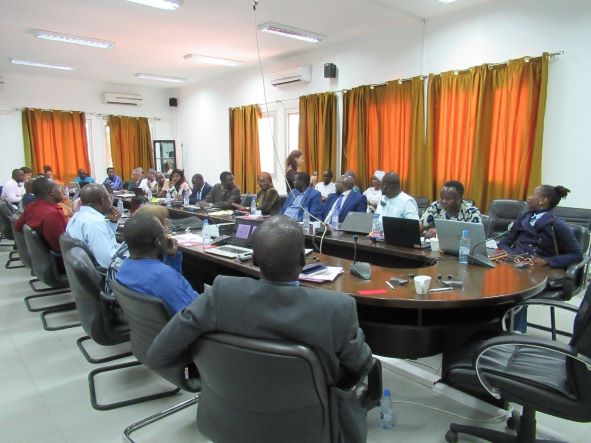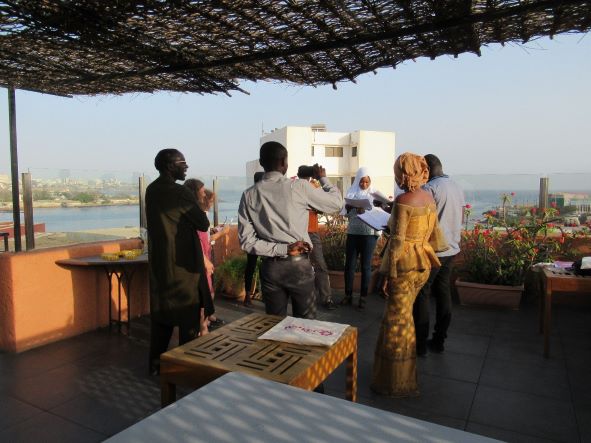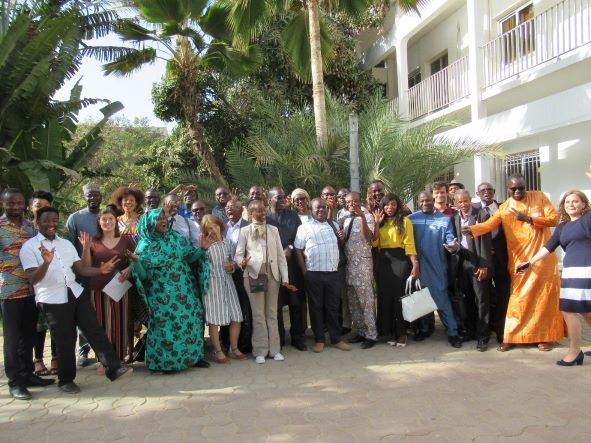
ASPIRE training participants gathered for a day of activities
There is a real need for good quality weather and climate information in the Sahel, and a need for this to be made available and integrated into social protection plans that aim to reduce the vulnerability of populations to extreme weather and climate impacts, such as droughts or floods. Adaptive Social Protection is a set of policies or programs that improve the resilience of vulnerable livelihoods to extreme events through integration of social protection, climate change adaptation and disaster risk reduction.
The ASPIRE project is working across three West African Sahelian countries (Senegal, Burkina Faso and Niger) to improve integration of climate and livelihoods information into adaptive social protection planning. As part of this, the Walker team recently traveled to Dakar, Senegal to run the first Adaptive Social Protection (ASP) training.
The training brought together people working in social protection and meteorological services, from across academia, NGOs and governments, to discuss integrating climate information into social protection planning and delivery. This has the potential to help reduce the impacts of extreme weather and climate events on communities and reverse the disaster-poverty trap.
35 delegates from 14 countries across Africa took part in the 2-day training programme, which used a range of activities to encourage the participants to consider why climate information is important for informing adaptive social protection, and how it could be better integrated.
One such activity was Theatre of the Oppressed, a piece of immersive theatre, which was run bilingually (in French and in English) in real time with acting skills provided by a group of PhD students from UCAD, Dakar. The bespoke script for this theatre centred around a minister having difficulties allocating and prioritising the social protection budget: should funding be targeted to areas where the climate risk is highest or areas where poverty and vulnerability is highest? The theatre was very well received with multiple interventions by the participants with one participant stating they would “take up the interactive theatre ourselves” in their own practice.

UCAD Students practicing the immersive theatre session the day before during a beautiful sunset on the rooftop bar we converted into our office for the week
The training activities were designed to build capacity and understanding of adaptive social protection across the Sahel region. Importantly, the connections made between key actors and departments working in social protection, in meteorological services, in climate and in livelihoods research provide the opportunity for greater collaboration in the future, and ultimately to improve social protection responses to climate events. This was a key theme in the feedback from participants on the value of the training:
“Better perspective in working with people from Met/Academia and to know how their work relates to our work”.
“It has opened the window wider to seek to continue collaborating with other departments to get data/info or knowledge to help to inform our programmes”.
“[Structure of the course] worked well-allowed for exchange -learnt much about experiences in Social Protection in conversations with others”.

ASPIRE training participants celebrating a successful two-day programme
ASPIRE is funded by the UK Department for International Development (DFID). The project consortium includes the Met Office, the Walker Institute at the University of Reading, and the Norwegian Refugee Council (NRC).
